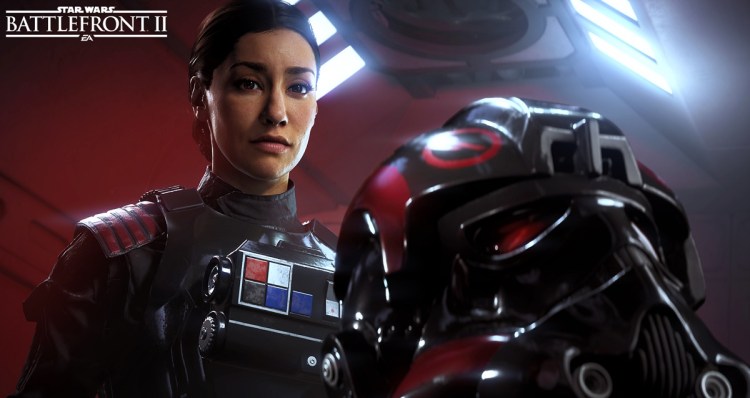Janina Gavankar didn’t grow up playing games, as she had a strict upbringing. But in her 20s, she became what she calls a “super-fan girl” who wanted to wanted to break into the game industry and get acting roles. She succeeded, as she is the actress playing Iden Versio, the main character of Star Wars: Battlefront II, one of the biggest games of the year from Electronic Arts.
Gavankar is also a passionate gamer and a tech-savvy industry insider. She recently created theForum.games, a forum for game developers where they can privately discuss matters with other professionals, and she is looking to expand her role in games with strong narratives. She wants to see more strong, realistic female characters in video games that reflect what gamers are really interested in. And, in an interview with GamesBeat, she said she understands much of the anger that gamers have expressed on the Internet about issues of respect, including EA’s recent struggles with fans about loot crates.
“The truth is, like I said, I wanted to have a seat at the table in the games industry for 10 years,” Gavankar said. “I didn’t think that it was going to be in, ostensibly, the most anticipated game of 2017. That’s had some highs and some lows. I’ll take all of it, because I’m still just so honored to be a part of it. I think people can tell I’m not faking my enthusiasm. I’m really excited. I got to be in a Star War. Come on.”
In the game, Versio is a new character in the Star Wars canon. She leads Inferno Squad, an Imperial special forces team that is caught on Endor after the second Death Star blows up at the end of Star Wars: Episode VI — Return of the Jedi. She grew up as a die-hard Imperial soldier, bred for fighting by her father and commander, Garrick Versio. But in story of Battlefront II, the Versios clash as the elder one orders his daughter to perform an atrocity on her home planet. That awakens what we might call the Gray Side in Iden, adding a complexity that drew Gavankar to the role.
The single-player story of Battlefront II ends with a lot of mysteries. But Gavankar said that story of Iden Versio will take a new twist on December 13, when the first downloadable content (DLC) arrives for the game just ahead of the movie, Star Wars: Episode VIII — The Last Jedi, which opens on December 15. Gavankar hopes this is just the beginning of how she’ll make waves in games.
“I definitely sit on a strange little fence between fangirl, mainstream media, and the games industry,” she said.
Here’s an edited transcript of our interview.
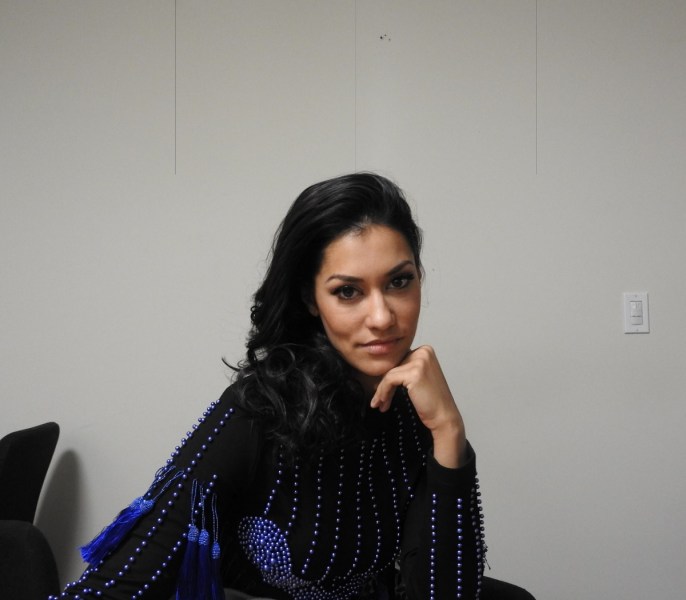
Above: Janina Gavankar plays Iden Versio in the starring role in Star Wars: Battlefront II.
GamesBeat: I read that you got into video games as an adult, right? You didn’t really grow up playing them.
Janina Gavankar: No. I had a super-strict upbringing. I wasn’t even allowed to watch television. I didn’t even know video games existed, really. I started playing in 2007, which was a banner year for video games. The first Mass Effect, the first Assassin’s Creed, the first BioShock, the first Portal, Twilight Princess, all of these incredible games, and I put so many hours into them. I felt like I had discovered some world that had just been waiting for me.
GamesBeat: Did you feel deprived?
Gavankar: I didn’t know what I was missing, so I was fine, but I certainly wanted to make up for lost time.
GamesBeat: I had the same thing with my parents and comic books. At a certain point they banned me from reading them. And then I had to sneak over to the comic book store. It’s interesting that we think of different media this way. Games were looked down upon.
Gavankar: Yeah. I kind of missed all that, though. I think that gamers in general, the demographic that makes up gamers, is mis-marketed relative to the general population. There’s a misunderstanding of who we are.
GamesBeat: The hardcore guys and geeks attitude.
Gavankar: Yeah. Also, to say that — the games industry is represented to mainstream media as Call of Duty and Grand Theft Auto. It’s like saying the film medium is only Saw and Justice League. There are so many beautiful, artful films out there. There are so many beautiful, artful games out there.
GamesBeat: What are you drawn to, through the roles or as far as the games you want to play?
Gavankar: The games I want to play are story first, deep narrative games. When I started playing games in 2007 I was attracted to the idea of the interactive movie. I was surprised, because I didn’t realize this had existed for years. I’m a nerdy artist person, you know? I’m interested in the deepest stories that are told within any medium. The games medium is the most intimate way to experience a story. I’m fascinated by it.
I am definitely picky about the roles — I mean, listen, in 2007 I was suddenly a gamer, and then I was walking around town trying to figure out if anybody in the games industry would pay attention to me, would let me have a seat at the table. I felt like I was pathetically championing the idea of me helping in any way. Nobody needed me. They don’t need my help. But I was like, “I will do anything!” I was working as an actor, obviously, but when it came to the game industry I was such a fan. I just wanted to get in where I could fit in. The first time that happened was with Far Cry 4. Luckily I got to be the female lead in that. But I would have done anything, any part of it.
As the years have gone by, I’ve definitely become pickier, because I’ve become more of a savvy gamer. I have lots of opinions, as many people do. I’m really looking for the most artful teams. I’m interested in supporting story. Battlefront has allowed me to make those choices even fuller now, because — an example would be, I got an audition for something, and the character breakdown was like a non-character. “She’s a real man’s woman. In a word, she’s kick-ass.” Congratulations.
We are so post — at least I am way past the “strong female” archetype. It just means she’s a dude with boobs. Also, men should be offended by these hyper-masculine characters as well. There’s so much more to — it’s embarrassing. We are way past that. Gamers are smart. They’re interested in characters that reflect themselves. We come in many forms. So I’m past the bullshit one-dimensional hyper-masculine character. I’m interested in complicated nuanced, stories, just like I am in TV and film.
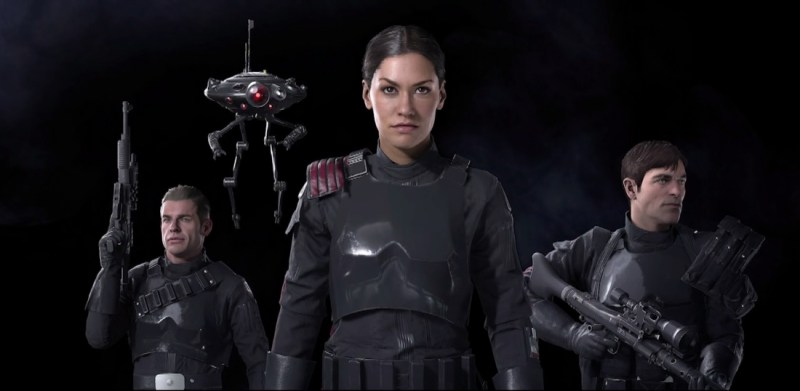
Above: Commander Iden Versio in Star Wars Battlefront II’s single-player campaign.
GamesBeat: I think of Iden as a sort of gray side character. Would you say that’s accurate?
Gavankar: I think she started very dark. I don’t know if you’re familiar with the books, but we have a prequel to Battlefront II in book form. It tells Iden’s origin story, as well as the Inferno Squad. She has a unshaking loyalty to the Empire, because she was bred to be the perfect soldier, the perfect officer. She thrives in this system. So all the way up until the moment you start playing the game, her story has been dark, dark, dark side.
Then the Emperor starts making choices that affect the people she loves, the people she’s been fighting for. It doesn’t make any sense to her. That’s when she has to make a decision she never thought she would have to make. But I don’t necessarily think that Iden is suddenly on the light side. Even in fighting with the Rebellion, she misses how it feels to be on the other side. She misses order. She misses cleanliness. She misses the way that people respect their training. I don’t think it’s easy for her when she has to make the decision to defect.
GamesBeat: These are relatively short cinematic scenes, where that story comes out. Sometimes just a few minutes break up the action. If you were going to expand this story, expand this role into something longer, what else do you think could happen?
Gavankar: There’s so much to tell. There are so many angles to this that I wish we had time to delve into further.
GamesBeat: That’s what I wanted from the campaign, something more like Wolfenstein II-sized cinematics.
Gavankar: Tom Keegan directed those as well. I’m obsessed with him as an actor’s director. He’s the best director I’ve worked with in any medium. I would love that. I’m an actor. All I want to do is get to work and tell the deepest version of the story that we can. But that’s what’s great about Star Wars. At any point we can add on and fill in blanks. The culture of Star Wars has been one that allows you to step into any point of the timeline and fill in a gap for people.
There’s so much story to tell, and I really would love to delve into what it’s like to make the decision even further. Like I said, it’s not easy for her, and she still misses the Empire. Notice that it’s not like she’s suddenly joined the Rebellion. She never says, “I’m a rebel now, I’m fighting for you.” She says, “I’m going to finish this thing that I don’t think is right. I’m going to handle Operation Cinder and then I’m out of here.” Just because she puts on the orange doesn’t mean she wants to be a rebel. She just says, “This thing is not okay and I’m going to settle it.”
GamesBeat: One thing I thought was, it seemed like there wasn’t enough there to convince me that she would so quickly turn from one side to another. They’re attacking her home planet, but I didn’t get a sense of, “That’s my neighborhood they just destroyed.”
Gavankar: I did all the work as an actor to fill in those gaps in my head. I would love to take the hard drive out of my brain and put it in yours so you could see why all of those things happened. I would love to have seen that as well.
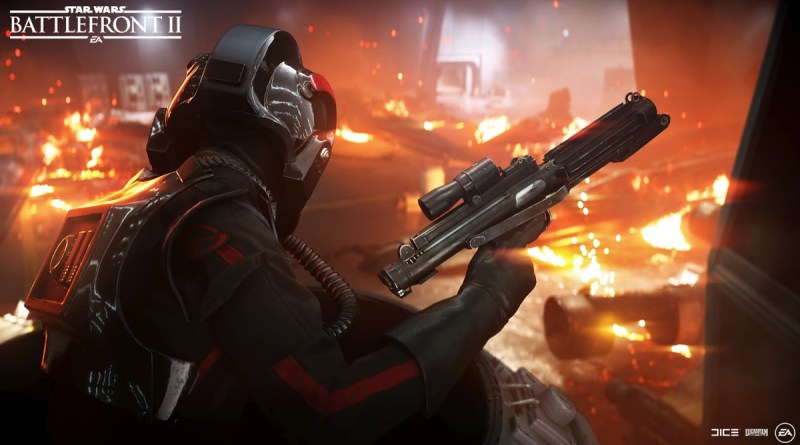
Above: Iden Versio in Star Wars: Battlefront II
GamesBeat: It still made for a very Star Wars story, a very compelling story about family.
Gavankar: I think so. I would love to spend time with Inferno Squad in their prime, before they have that massive emotional breakup. I’d love to spend time after they’re on Jakku and she turns around and finally has this space to realize there’s love between her and Del. She’s essentially in retirement, right? But we’re talking about a girl who loves being faster, better, stronger than everyone around her. For her to have to force retirement on herself is not easy. It’s not fun. She doesn’t want to do it.
There’s a lot of — I wonder, does she go into a cycle of depression right after that? What’s it like to be Iden after she says it’s over? She feels a sense of relief, because she’s accomplished a mission, but now she has to deal with the repercussions of starting life over again, without leaving everybody behind. Also, we know she has a daughter, so now she’s pregnant. What does a pregnant Iden go through? Does she want to be a mom? Is she a good mom? I can’t imagine she’s very motherly. I’d love to see that character. We don’t see a ton of women characters that become mothers, but they aren’t the most wonderfully coddling sweet mom. Moms come in all shapes and forms. I’d love to know what Iden’s like as a mother, when she has a toddler running around whatever planet they’re on.
GamesBeat: And then Hask comes back.
Gavankar: Oh, he’s so mad.
GamesBeat: It ends in a way that leaves so many questions unanswered.
Gavankar: You are going to see what happened. December 13 we have the continuation of the story.
GamesBeat: I was going to ask, yeah, the DLC actually continues that?
Gavankar: Yeah, the free DLC on the 13th. I think we’re calling it “Resurrection.” That’s the ending chapter to the Battlefront II story.
GamesBeat: Is there a strong reason to tie it more to the movie?
Gavankar: Oh, yeah, absolutely. There’s so much stuff in there that ties to the movie. It’d blow your mind. The great thing is, we’re releasing on the 13th, and the movie comes out soon after. I hope people play it on that day, because it’ll really bring you into it. We cover the First Order. You’re going to see — I can’t tell you what, but there are things you have never seen before in the movie that you will see in the game first.
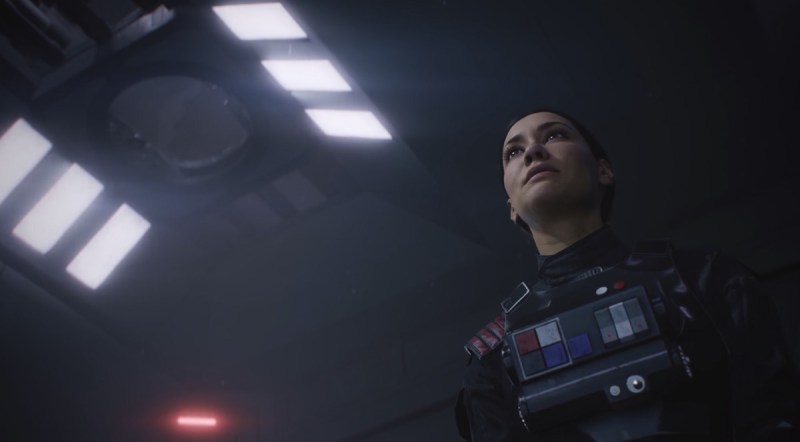
Above: Iden Versio is head of Inferno Squad in Star Wars: Battlefront II.
GamesBeat: It’s nice that Disney will allow some of this to happen in a game.
Gavankar: I can’t believe it. Or I can believe it and I can’t. Part of me thinks, “Wow, they really are integrating this. I can’t believe it.” But if you were on set with us and you saw how invested the Lucasfilm story group was in making sure we created an authentic story that fits seamlessly into the galaxy, you’d say, “Oh, of course they’re integrating at this level.”
But it is surprising. When you join a project you think, “Eh, it can’t be that great. I have to go in with low expectations.” But really, they’ve been with us every step of the way.
GamesBeat: What has the fan reaction to the story and your role been like?
Gavankar: I think people really love Iden. Which, thank God, you know? I think that people understood exactly what I was trying to do performance-wise, which is something I was worried about. I went for a very subtle performance. I didn’t make it big. I kept everything very contained. What I would do on camera elsewhere — I mean, it’s an on-camera performance. You have a thousand cameras around you. But I chose to be really subtle. I didn’t flap my arms. I didn’t use every muscle in my face. I really just had thoughts, and thank God, the technology has come far enough to catch it.
GamesBeat: I was struck by the lack of emotion she had when the Death Star blows up.
Gavankar: Well, she does, but she has to shove it all deep down to get off Endor’s moon. That’s the problem. When you’re a commander, if you take any time to grieve, you’re dead and the squad is dead. You have to look out for the people that follow you.
GamesBeat: That seems to be the way the Empire is. It’s not going to let in anybody soft.
Gavankar: Yeah. You don’t get to be an officer if you’re a softie. But she even says — you see her try to fathom what’s happening in front of her eyes, and then she just shoves it all down and turns to look at her squad and say, “Grieve later.” Because even if she shows that moment of emotion to them, she’s already not running shit the way she needs to.
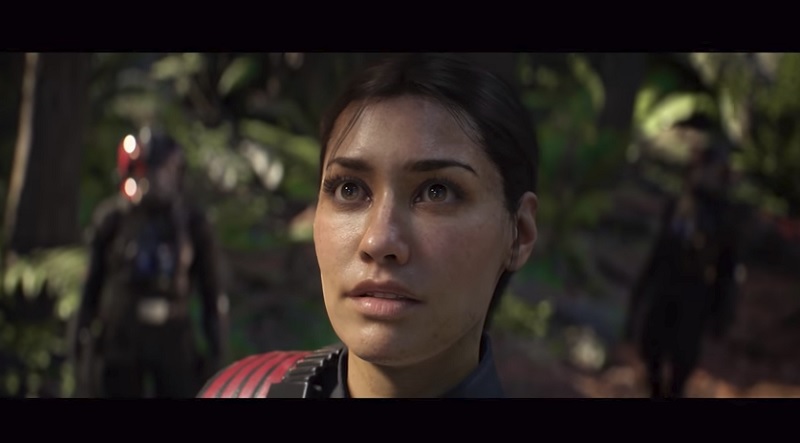
Above: Iden Versio sees the second Death Star blow up.
GamesBeat: Fans have gone crazy over the loot crate situation. Hopefully that hasn’t spilled over for you in some way.
Gavankar: It has, but it hasn’t. The truth is, like I said, I wanted to have a seat at the table in the games industry for 10 years. I didn’t think that it was going to be in, ostensibly, the most anticipated game of 2017. That’s had some highs and some lows. I’ll take all of it, because I’m still just so honored to be a part of it. I think people can tell I’m not faking my enthusiasm. I’m really excited. I got to be in a Star War. Come on.
Did I see any of that stuff coming? No. But again, I’m a gamer, and I know something about my people. We’re savvy. We know who’s who. So I haven’t had a ton of spillover, because people know that I’m a part of the story. I didn’t see any of that stuff coming. I’m nothing to do with it. And I’m thankful to them for realizing what my job is in all of this.
GamesBeat: It seems like authenticity really matters on the internet, Twitter, social media, wherever.
Gavankar: Another reason why I respect the voices out there is because I am one. I understand what it feels like to be a geek. I understand what nerd rage is because I feel it every day of my life about something. I think this might be the reason why people have been so nice to me. When people see themselves in a — how do I say this in the best way? Okay, I’ll say the opposite. When people see somebody who is an inauthentic voice in a space they love and hold dear, they want to kill that thing for ruining the thing they love. I feel the same way. I think people know where my heart is.
GamesBeat: I’ve felt some heat from gamers when I cross that line, yeah.
Gavankar: Right. But I respect it.
GamesBeat: It’s interesting that people can be both super fans and super haters at the same time.
Gavankar: Well, we’re passionate people. All of my feelings go to 11 and stay at 11. When I love something I love it so loudly, and when I hate something I hate it just as loudly.
GamesBeat: You’re pretty tech-savvy. You were one of the first people on Twitter.
Gavankar: Yeah, I’m an early adopter in general.
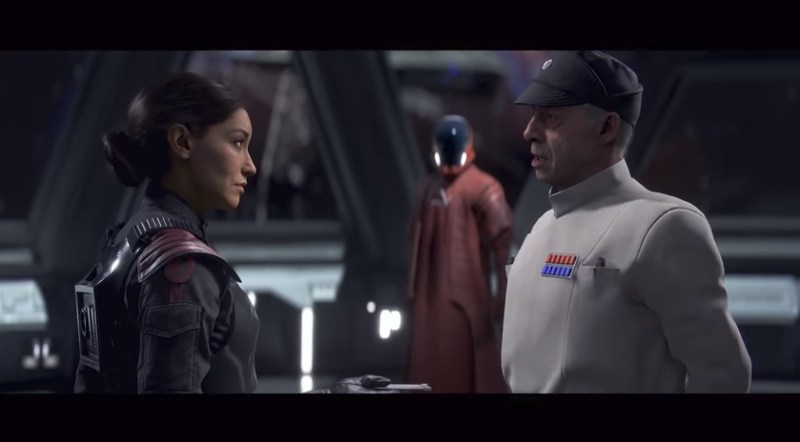
Above: Iden Versio is the daughter of Garrick Versio, an Imperial commander.
GamesBeat: Did you see this evolve and come to the right approach to social media in general, do you think?
Gavankar: Chris Sacca told me about Twitter in 2006. It was really weird. We were on Richard Branson’s private island. It was this really weird tech trip. By the way, this is back before smartphones, right? If you wanted to tweet, you had to tweet to — 04040 or something? I think this still works? It was this Texas number and then you were tweeting and everyone would get the text. That was the original dissemination of tweets. Maybe I can test it. I feel like it’s still in my phone.
GamesBeat: I didn’t get on until 2008 or so.
Gavankar: Oh, you’re so late. Yeah, 40404. “Test. Texting my tweet. Does this method still work?” Someone check Twitter and see if that comes up. When he told me about it I saw it as, “Oh, as a performer I now have an opt-in mailing list that’s immediate to people’s phones.” No, it doesn’t look like it works. How sad. It’s dead.
GamesBeat: Maybe it’s just really slow.
Gavankar: I don’t know. Anyway, for me, the thing that — their tagline was, “It’s an answer to a question that has yet to be asked.” That was the hype train they were trying to get everybody on. For me, as a performer, I said, “There’s no friction. They just follow you. If you have a thought or you want to tell people about something you’re doing, it’s immediately on their phones. No opening an email. It’s right there.” So I understood it immediately. I think I was the first performer, actor, whatever who used it. Somebody had to be first. It just happened to be me.
But I’ve been an early adopter of things in general. Posterous, which got — the entire team got bought by Twitter and absorbed. They’re all doing fabulous things right now. They created a template for actors and artists to use to represent themselves in a plug-and-play way. I’m a first-round investor in ClassPass. These things are a part of my life that not a lot of people know about, but they’re a big part of my life. I’m an investor in Boulevard, another startup in Los Angeles.
GamesBeat: We see a lot of problems with social media these days. The news climate is absolutely crazy. Do you see any ways to fix that? Like presidential tweets.
Gavankar: Just like with any other medium — if you don’t want to watch CNN you change the channel. Just turn it off. Unfollow. Block. But you have to be diligent about the way in which you engage. If it’s causing you anxiety, do not engage. Social media are just an extension of any group of — if you know assholes hang out at a bar, you don’t go to that bar, right? Mute, block, use the tools to get them out of your life.
And yeah, I do agree that it has — it’s sad to say, but we all know that the way these news outlets are keeping the lights on is by covering things that are clickable, covering things that people are going to watch. Fear-based media has been around for a really long time. It’s nothing new. Misinformation has been around for a really long time. It’s nothing new. If you’re a smart person and you have something — if you’re receiving information in a way you don’t like, don’t engage. Don’t cry about it. Do something about it.
GamesBeat: As we spread across the galactic Empire, I would love to see humans evolve to some higher form.
Gavankar: I’d love that too. But we’re going to have to be really diligent about that and choose that for ourselves.

Above: Iden Versio gets second thoughts.
GamesBeat: Have you played any multiplayer in Battlefront?
Gavankar: I have. Even though I’m not actually a multiplayer kid. I’m a story-first gamer. I like to crawl into a hole and play — I’m a completist too, so I’ll play a game to 100 percent it, all the way. I’ve played multiplayer in Battlefront — the first Battlefront I played, and then I’ve of course played Battlefront II. It’s so damn pretty. Also, I wanted to see what Iden was like to play. I want to know her capabilities, how to be her in every — everywhere she shows up in the galaxy I want to know what it’s like to be her.
That happened with the book, too. They asked me to voice it, so I got to voice the audiobook. I just voiced a 90-second breakdown of the book for an animated show called “Lore.” I’ll say yes to anything. Any time she shows up, anywhere, I’ll just say, “Yes. Where? When?”
GamesBeat: Do you hope she gets into the canon in a bigger way?
Gavankar: She’s in the canon in a pretty big way already. Having this game be as big as it is — but of course, would I like to see her on film or in television shows? Absolutely. If it was you, wouldn’t you say yes?
GamesBeat: What else do you want to do in gaming?
Gavankar: Oh, God, I want to do so many things. I quietly created a forum for game developers to speak freely with each other. It’s invite- and approval-only. Because game developers have to work in silos, they don’t talk to each other. That’s unfortunate, because they’re artists, and they need to be talking about game theory and design, supporting each other instead of having this lonely existence that ends in crunch. Crunch is abusive. I wanted to create a safe place for diverse voices in the games industry to talk to each other. It’s called theForum.games.
GamesBeat: It’s funny that that didn’t exist already.
Gavankar: It’s very strange. But that’s the thing. Because they have to work in silos, it took a fangirl to create it. It happened when NeoGAF got pulled down. I’m a super NeoGAF lurker. It was down during the biggest releases of the year. I was like, “I need a place to read all the conversations!” I was starting to freak out.
I called my ex-boyfriend, who is the CEO and founder of DeviantArt — we’re still friends. We were together for five years and we’re friends now — and I asked him, “How fast can we put up a new forum?” He said, “What are you doing right now?” So we built one. Then NeoGAF went back up, which I’m happy about, because it made us look at each other and think, “Is this actually needed?” I called many of my friends in the games industry and it was a resounding “Yes.” So I basically tightened the lens. I made it private, invite-only. It will grow slowly. It will be quality, not quantity. It won’t be noisy. It’ll be a safe place to ask questions of each other, of their peers.
GamesBeat: Are you happy if something like that gets to be in the hundreds of people?
Gavankar: Oh, it already is. If it’s needed, it will exist, and it will continue to grow. I’ll have AMAs, but instead of 3,000 questions, it’ll have whatever the community needs to know. And then that artist will be able to sit and answer at length. That’s happening in smaller ways. There are Facebook groups. Each city — obviously San Francisco has a community of game developers that know each other. But I’d love to be able to help bridge the gap. If it’s necessary it will grow on its own. I’m not hoping and praying for people to join. They’ll join if they need to join.
GamesBeat: We try to make that happen with our GamesBeat conferences.
Gavankar: That’s the thing. Because artists need to support artists. They need to feel safe to create, and not create out of fear of criticism. That’ll help the entire industry grow. So we’ll see. But it is something we’re really excited about.
There are some things I can’t talk about in the writing side of my life. I guess the short version of it is, I would love to start telling stories in this medium. I feel as though I just got here. I have a lot of work to do to earn the right to do that, but I have no qualms putting the work in.
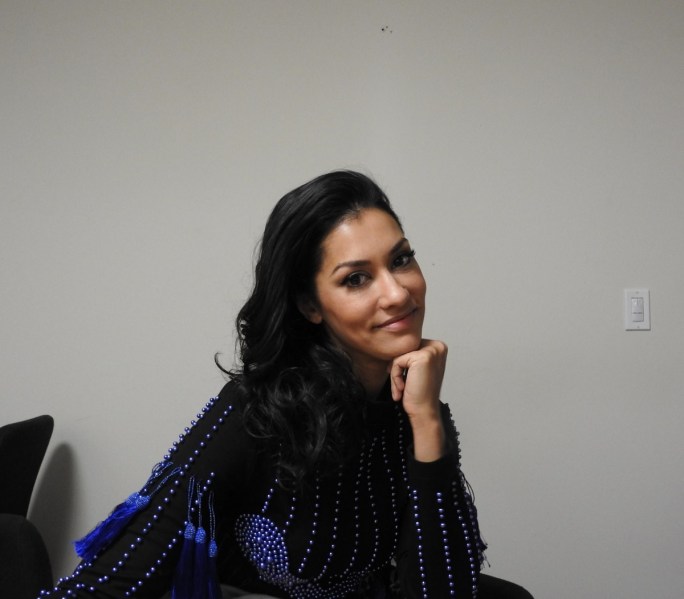
Above: Janina Gavankar was one of the earliest actresses to get on Twitter.
GamesBeat: Have you thought, then, about having your own games studio?
Gavankar: Yes. It’s mid-burner. I’m still an actor. When I’m on a television show I’m working 16 hours a day.
GamesBeat: I don’t think there are many people who cross over so much that way.
Gavankar: I definitely sit on a strange little fence between fangirl, mainstream media, and the games industry. In this past year it’s been really interesting for me. For example, my publicist set this up with you, right? You talked to her. She’s the fucking best. She’s spent half a year learning about the games industry, as much as she could, because she understands it’s a different place from mainstream media, which is what she’s used to.
I was in New York, taking meetings with Hearst and Conde Nast, which are big companies that I have had press moments with in the past. You take these general meetings. They’re not like this. This is an actual “let’s sit down and spend time.” A general meeting with a magazine like that is, some journalist is sent to come meet you in the lobby, essentially, and talk with you for 10 minutes to see if there’s a story in you, if they should care at all. And then they talk to — especially if it’s a women’s magazine, they talk to 15 actresses about their new movie that’s coming out, and they decide whether they care or not.
Now, for me, I walk in and they have no idea where to start, because they don’t know anything about games. So I start saying things like, “Let me just give you a little education on triple-A games. The budgets are $200-300 million sometimes. Let’s say it sells 15 million copies. Each copy is $60. Do that math.” And then their eyes kind of bulge and I say, “This game release will be bigger than the last 15 actors you just talked to. That’s why you should pay attention.”
I’m very happy — even though I say it with a little bit of venom that I’m trying to mask at all times — the mainstream media doesn’t cover games the way they should. They don’t pay attention to them. They don’t respect them the way they should. On one hand it’s really annoying, because I love it so much an I want the artists in this medium to get the respect they deserve. But on the other hand, we don’t need them anyway.
The games industry has existed for a very long time without the attention of mainstream media. I’m fine with that. But because I sit on this fence between fangirl, games industry, and mainstream media, I want everyone to love the thing I love as much as I do. And respect its nuances the way that I do.
GamesBeat: It’s like you’re crossing tribes. There’s always this outside looking in at the tribe, or the insiders associating with other tribes.
Gavankar: It’s funny, because I know I’m supposed to talk to you about fashion, but I don’t give a shit. I really want to talk about video games.
GamesBeat: You have the makings of being a leader as you cross over.
Gavankar: If people want me to be. In the meantime I’m okay with being a foot soldier that’s just trying to make people to pay attention to the things they should pay attention to.
GamesBeat: The special forces kind.
Gavankar: Ghost Recon. We get in and we get out before anyone realizes we’re there.
